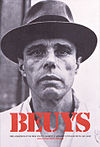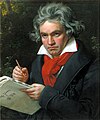Portal:North Rhine-Westphalia/Selected biography
Selection number 1[edit]
Konrad Hermann Joseph Adenauer (5 January 1876, Cologne – 19 April 1967) was a German statesman.
Although his political career spanned sixty years, beginning as early as 1906, he is most noted for his role as the first Chancellor of the Federal Republic of Germany (then known as West Germany) from 1949–1963 and chairman of the Christian Democratic Union from 1950 to 1966.
Selection number 2[edit]
Joseph Beuys (May 12, 1921, Krefeld – January 23, 1986, Düsseldorf) was a German performance artist, sculptor, installation artist, graphic artist, art theorist and pedagogue of art.
His extensive work is grounded in concepts of humanism, social philosophy and anthroposophy; it culminates in his "extended definition of art" and the idea of social sculpture as a gesamtkunstwerk, for which he claimed a creative, participatory role in shaping society and politics. His career was characterized by passionate, even acrimonious public debate, but he is now regarded as one of the most influential artists of the 20th century.
Selection number 3[edit]
Ludwig van Beethoven (baptised 17 December 1770 – 26 March 1827) was a German composer and pianist. He was a crucial figure in the transitional period between the Classical and Romantic eras in Western classical music, and remains one of the most acclaimed and influential composers of all time.
Born in Bonn, of the Electorate of Cologne and a part of the Holy Roman Empire of the German Nation in present-day Germany, he moved to Vienna in his early twenties and settled there, studying with Joseph Haydn and quickly gaining a reputation as a virtuoso pianist.
Selection number 4[edit]
Hans-Hubert "Berti" Vogts (German pronunciation: [ˈbɛɐ̯tiː foːkts], born on 30 December 1946 in Kaarst, near Neuss) is a German football manager.
As a player Vogts spent his entire career with Borussia Mönchengladbach and was part of the German squad that won the 1974 FIFA World Cup. He managed the German national team from 1990 until 1998 and is currently manager of the Azerbaijan national team.
Selection number 5[edit]
ⓘ (born at the family seat castle Burg Hülshoff (now a part of Havixbeck) January 10, 1797 – May 25, 1848) was a 19th century German author, and one of the most important German poets.
Selection number 6[edit]
Herbert Grönemeyer (born April 12, 1956) is a German musician and actor, popular in Germany, Austria and Switzerland. He starred as war correspondent Lieutenant Werner in Wolfgang Petersen's movie Das Boot, but later concentrated on his musical career. His fifth album Bochum (1984) and his 20th album Mensch (Human) (2002) are the best-selling German-language records of all time.
Grönemeyer often refers to his personal roots as lying in the German city of Bochum where he spent most of his childhood, youth and early adulthood.
Selection number 7[edit]
Dorothee Pesch (born 3 June 1964, Düsseldorf, Germany), popularly known as Doro Pesch or Doro, is a female vocalist, formerly of the German heavy metal band Warlock.
After Warlock went through many line-up changes, Pesch was the only remaining original member of the band. After changing her record label, she released the fifth album as Doro, as the former label owned the trademark on the Warlock name.
Pesch now pursues a solo career and lives in New York City. The 2004 album Classic Diamonds was a collaboration with The Classic Night Orchestra which reworked some of her earlier songs. Her latest album is Fear No Evil which was released in 2009.
Archive[edit]
Archive 1[edit]
Heinrich Theodor Böll (December 21, 1917 in Cologne – July 16, 1985) was one of Germany's foremost post-World War II writers. Böll was awarded the Georg Büchner Prize in 1967 and the Nobel Prize for Literature in 1972.
Archive 2[edit]
Johannes Rau (16 January 1931 – 27 January 2006) was a German politician of the SPD. He was President of Germany from 1 July 1999, until 30 June 2004, and Prime Minister of North Rhine-Westphalia from 1978 to 1998.
Nominations[edit]
Nomination 1[edit]
Johann Adam Schall von Bell (Chinese: 湯若望; 1 May 1591, in or near Cologne – 15 August 1666, Beijing), was a Jesuit and astronomer.
Schall von Bell went to school in Cologne and studied theology and astronomy in Rome. He was sent to China as a missionary and learned Chinese in Macau. Due to his profound knowledge in astronomy he became an advisor to the Shunzhi Emperor of the Qing Dynasty and rose to the rank of a mandarin. He is known for his contributions reforming the Chinese calendar.
Nomination 2[edit]
Anne of Cleves (German: Anna; 22 September 1515 – 16 July 1557) was Queen of England from 6 January 1540 to 9 July 1540 as the fourth wife of King Henry VIII.
Anne was born in 1515 in Düsseldorf, the second daughter of John III of the House of La Marck, Duke of Jülich jure uxoris, Cleves, Berg jure uxoris, Count of Mark aka de la Marck and Ravensberg jure uxoris (often referred to as Duke of Cleves) who died in 1538, and his wife Maria, Duchess of Julich-Berg (1491–1543). She grew up living in Schloss Burg on the edge of Solingen.










